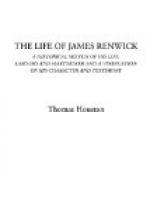Two matters of general public interest, and intimately connected with the position of Renwick and his associates, excited particular attention in the concluding period of the persecution. These were, 1, The measure called THE INDULGENCE; and, 2, The limits of Civil Authority, and of the allegiance of the subject.
I.—THE INDULGENCE.
When the power of the persecutors was unable to put down the preaching of the gospel in the fields, and to crush the spirit of liberty in the breasts of multitudes of the people of Scotland, the Indulgence was a master contrivance of the arch-enemy to divide the Presbyterians, and to seduce them to abandon some of their fundamental principles, for the sake of outward advantages. The first indulgence was issued by Charles II. and his council in June, 1669. It was proclaimed as flowing directly from the royal supremacy. The power was granted to the persecuting Council, at their discretion, to appoint certain of the outed ministers to vacant parishes, on ensnaring conditions. In case they refused to receive collation from the bishops, they could not have the stipends or tiends, they were only to possess the manse and glebe, and be allowed an annuity. If they did not attend diocesan synods, they were to be confined within the bounds of their own parishes. They were not to dispense ordinances to persons from other parishes, nor, on any account, to hold conventicles. They were prohibited from speaking against the king’s authority, or the public measures of the government; and they were to report their peaceable behaviour from time to time to the Council.
Two other indulgences were issued at intervals during the latter part of the reign of Charles II. All of them by public proclamation denounced relentless vengeance against the faithful men who refused the royal boon. They threatened utter extermination to all who pleaded for the independence of the Presbyterian Church, and who maintained the freedom of the gospel by holding conventicles, preaching and administering ordinances in their purity in the fields.
The indulgence unhappily proved a snare in which by far the largest number of the Presbyterian ministers in Scotland were entangled. We cannot hesitate to agree with the historian Hetherington, in holding that “It was offered on a principle clearly subversive of the Presbyterian Church, and that not one of the ejected ministers ought to have accepted of it, because it was impossible to do so, without sacrificing the fundamental and essential principle of the Presbyterian Church—that which constitutes its glory and its life—the sole sovereignty of Christ."[1] Three results followed the acceptance of the indulgence, which proved highly injurious to the Presbyterian Church, and which were, in all likelihood, foreseen by the contrivers of the measure, and led them to introduce it. These were—1. The constant interference of the government with the indulged in




